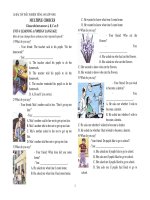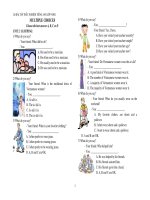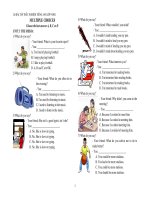Grade 9 - UNIT 8
Bạn đang xem bản rút gọn của tài liệu. Xem và tải ngay bản đầy đủ của tài liệu tại đây (479.04 KB, 6 trang )
<span class='text_page_counter'>(1)</span><div class='page_container' data-page=1>
1
GETTING STARTED - LISTEN AND READ :
1. celebration (n): sự tổ chức lễ to celebrate (v): tổ chức lễ celebratory (adj) celebrity (n):
người nổi tiếng
2. icon (n) : biểu tượng
<b>3. to represent sth: tiêu biểu cho, tượng trưng cho representation (n): sự đại diện representative </b>
(adj) representative (n): người đại diện
4. Easter (n): Lễ Phục Sinh
5. Christmas (n): Giáng sinh
6. Mid-Fall Festival (n): Tết trung thu, Mid-Autumn Festival, Full-moon festival
7. Lunar New Year (n): Tết nguyên đán
8. festival (n): lễ hội festive (adj)
9. to occur (v): xảy ra = happen, take place occurrence (n): chuyện xảy ra, sự kiện
<b>10. It’s (a / high) time for someone to do sth : Đến lúc ai đó phải làm gì </b>
Ex: It’s time for him to review his lessons for next exam.
<b> It’s (a / high) time + S + V2/ed </b>
Ex: It’s time he reviewed his lessons for next exam.
11. to decorate (v): trang trí decorator (n): người trang trí
decoration (n): việc trang trí, đồ vật dùng để trang trí
decorative (adj): để trang trí, để trang hồng, để làm cảnh decoratively (adv)
12. sticky (adj): dính sticky rice (n): gạo nếp sticky rice cake : bánh chưng, bánh tét
13. to live apart : sống xa nhau
14. to be together (adj): tập họp, sum họp
15. Passover (n): Lễ Quá Hải / Lễ Vượt Qua (của người Do Thái)
16. Jewish (adj): thuộc về, liên quan đến Do Thái Jew (n): người Do thái = Jewish people
17. freedom (n): sự tự do free (adj): tự do, rảnh rỗi, miễn phí freely (adv)
<b> to free from (v): trả tự do, giải thốt, phóng thích </b>
<b>18. slavery (n): chế độ nô lệ, ách nô lệ to be sold into slavery </b>
a slave (n): người nô lệ slaver (n): chủ nô slave (v): làm việc đầu tắt mặt tối
19. ancient (adj): cổ, cổ xưa anciently (adv)
20. joyful (adj): vui mừng, hân hoan ≠ joyless (adj) joyfully (adv) : 1 cách vui mừng
joy / joyfulness (n): niềm vui, niềm hân hoan
21. to receive (v): nhận receipt (n): biên nhận, biên lai receivable (adj)
22. as long as = only if : miễn là, với điều kiện là
Ex: We let him stay at home as long as he finishes the project on time.
<b>23. to crowd somewhere : tụ tập, tập trung tại nơi nào crowd (n): đám đông crowded (adj) </b>
24. a parade (n): march (n): cuộc diễu hành, cuộc diễu binh, cuộc duyệt binh parade (v)
SPEAK - LISTEN
<b>25. compliment (n): lời khen, lời chúc mừng to give a compliment (n): đưa ra lời khen, khen ngợi </b>
26. compliment (v): khen ngợi, ca tụng.
<b>27. to respond TO sth : đáp lại, trả lời cái gì response (n) </b>
28. Well done! : làm tốt lắm!
29. That’s a great / an excellent …… : Thật là một …….. tuyệt vời
<b>30. to congratulate (v): chúc mừng to congratulate sb ON doing sth : Chúc mừng ai về việc gì </b>
congratulation (n): lời chúc mừng Congratulations ! : Xin chúc mừng !
Let me congratulate you on … / Congratulations on your… : Xin chúc mừng bạn về …
31. It’s nice of you to say so : Bạn thật tốt khi nói thế = That’s very kind of you.
32. act (v): hành động action (n) hành động activity (n): hoạt động active (adj): tích cực, lanh
lợi ≠ inactive (adj) actively (adv) activist (n): nhà hoạt động
</div>
<span class='text_page_counter'>(2)</span><div class='page_container' data-page=2>
2
<b>34. to nominate (v): đề cử, chọn to be nominated AS ….. : được bầu chọn, đề cử là …. </b>
nomination (n): sự đề cử nominee (n): người được đề cử
35. Auld Lang Syne : Ngày xưa tươi đẹp = The good old days
<b>36. acquaintance (n): người quen, sự quen biết acquaint (v) = get acquainted with: làm quen </b>
37. trust (v) (n): tin tưởng trusty (adj): đáng tin cậy = reliable (adj)
truthful (adj) = honest (adj): chân thật truthfully (adv)
READ :
38. excite (v) excitement (n) excited / exciting (adj): hào hứng excitedly / excitingly (adv)
<b>39. It’s an occasion for someone to do sth: Một dịp để ai đó làm gì </b>
40. to express (v): bày tỏ, biểu lộ, diễn đạt, phát biểu ý kiến
expression (n): sự bày tỏ, sự biểu lộ (tình cảm…), sự diễn đạt (ý nghĩ..)
41. feeling (n): cảm xúc, tình cảm, cảm giác feel (v) feel (n): tiếp xúc
<b> to express one’s feelings TO someone : bày tỏ tình cảm của ai với ai </b>
Ex: He expresses his feeling to his girlfriend on Valentine Day.
42. memory (n): ký ức, trí nhớ memorial (adj) (n): thuộc tưởng niệm / đài tưởng niệm
to memorize (v): ghi nhớ
memorable (adj): đáng nhớ memorization (n): sự học thuộc lòng, ghi nhớ
43. to lose heart (exp): nản lịng; thối chí
44. to describe (v): diễn tả, mơ tả
description (n): sự diễn tả, sự mô tả descriptive (adj) descriptively (adv)
45. to guess (v): đoán guessing (n)
<b>46. tear (n): nước mắt, lệ with tears in someone’s eyes : nước mắt rưng rung </b>
tear-tore-torn (v): xé
47. towards (prep): về phía, về hướng
48. hug (n): sự ơm chặt, sự ghì chặt to hug (v): ơm ấp, ơm chặt
<b> to give sb a hug : ôm ai </b>
49. groom = bridegroom (n): chú rể # bride (n): cô dâu
50. moment (n): khoảnh khắc, lúc at the moment
51. considerate (adj): ân cần, chu đáo considerateness (n): sự ân cần, sự chu đáo
<b> It’s considerate of sb to do sth : người nào đó thật chu đáo làm gì </b>
considerately (adv): 1 cách chu đáo ≠ inconsiderate (adj)
considerable (adj): đáng kế, to tát considerably (adv) consideration (n): sự xem xét, chú ý
52. generous (adj): rộng lượng, hào phóng generously (adv)
generosity (n): sự rộng lượng, sự hào phóng, lịng tốt
53. priority (n): quyền ưu tiên, sự ưu thế prior (adj)
prioritize (v): ưu tiên hóa prioritization (n): việc ưu tiên hóa, đưa lên hàng đầu
54. humor (n): sự hài hước sense of humor : khiếu hài hước, óc hài hước
humorous (adj): hài hước, khôi hài humorously (adv) humourist (n): người có óc khơi hài
humourless (adj): không hài hước humourlessly (adv)
55. to distinguish (v): phân biệt
<b> to distinguish sb / sth FROM sb/sth: phân biệt ai/cái gì với ai/cái gì </b>
<b> to distinguish BETWEEN sb/sth AND sb/sth : phân biệt giữa ai/cái gì và ai/cái gì </b>
distinct (adj): dễ phân biệt distinguished (adj): lỗi lạc, xuất sắc
<i> distinctive (adj): đặc biệt distinction (n): sự phân biệt </i>
56. In a word (exp): nói tóm lại
57. terrific (adj): xuất sắc, tuyệt vời terrifically (adv)
58. image (n): hình tượng, hình ảnh
59. alive (adj): cịn sống, đang sống # dead (adj): chết
<b>60. to draw sth FROM sth : rút ra được điều gì từ cái gì </b>
WRITE
</div>
<span class='text_page_counter'>(3)</span><div class='page_container' data-page=3>
3
LANGUAGE FOCUS
64. culture (n): nền văn hóa
cultural (adj): thuộc về, liên quan đến văn hóa cultural house : nhà văn hóa culturally (adv)
65. lap (n): đùi
<b>66. to satisfy (v): làm hài lòng = to please to be satisfied WITH sb/sth: hài lịng về ai/cái gì </b>
satisfying (adj) satisfyingly (adv) satisfied (adj): hài lòng satisfaction (n)
satisfactory (adj): có thể chấp nhận được satisfactorily (adv)
67. to prepare (v): chuẩn bị
preparation (n): sự chuẩn bị preparatory (adj)
68. Relative clauses : Mệnh đề quan hệ
69. Adverb Clause of concession : Mệnh đề trạng ngữ chỉ sự nhượng bộ
Even though / Although / Though : Mặc dù
70. due to = because of: do, vì
71. The weather bureau: Cục thời tiết
72. to predict (v): dự đoán prediction (n): sự dự đốn predictive (adj): có khả năng tiên đốn, dự
báo predictable (adj): có thể tiên đoán, dự báo trước predictably (adv)
predictor (n): vật dự báo predictability (n): khả năng dự báo
<b>73. to help sb WITH sth: giúp ai việc gì </b>
Ex: He helps me with my homework.
<b>to help sb do / to do sth : giúp ai làm gì </b>
Ex: He helps me do/to do my homework.
<b>to help do sth : giúp làm gì </b>
Ex: He helps do my homework.
74. jumper (n): áo tròng qua đầu
75. to compose : sáng tác, soạn thảo composer (n): người sáng tác composition (n): tác phẩm
(bản nhạc, bài thơ…)
76. pride (v): tự hào pride (n) take pride in = be proud of proudly (adv)
<b>I/ Relative clauses: (Mệnh đề quan hệ ) </b>
Mệnh đề quan hệ luôn được đặt ngay sau danh từ hoặc ngữ danh từ mà nó muốn làm rõ nghĩa.
Defining (Xác định )
<i><b>1/ Who: được dùng làm chủ ngữ trong mệnh đề quan hệ, thay cho danh từ hoặc ngữ danh từ chỉ người </b></i>
Ex: Mai is the girl. She plays the guitar.
Mai is the girl who plays the guitar.
<i><b>2/ Whom: được dùng làm túc từ trong mệnh đề quan hệ, thay cho danh từ hoặc ngữ danh từ chỉ người. </b></i>
Ex: The boy is Tom. We are looking for him.
The boy whom we are looking for him is Tom.
<i><b>3/ Which: được dùng làm chủ ngữ hoặc túc từ trong mệnh đề quan hệ, thay cho danh từ hoặc ngữ </b></i>
danh từ chỉ vật.
Ex: He can do the exercises. They are difficult.
He can do the exercises which are difficult.
<i><b>4/ Whose: được dùng chỉ sự sở hữu trong mệnh đề quan hệ, thay cho danh từ hoặc ngữ danh từ người </b></i>
hay vật.
</div>
<span class='text_page_counter'>(4)</span><div class='page_container' data-page=4>
4
<b>II/ Adverb clauses of concession: </b>
● But / however / though / although / even though + Clause (S + V)
Ex: Although it rains, he still goes to school on time.
<b> S V </b>
Even though she is rich, she always spends her money economically.
Though they practiced so often, they couldn’t win that game.
● Despite/ In spite of + Noun phrase (Adjective + Noun / V-ing…)
Ex: Despite the rain, he still goes to school on time.
<b> Noun phrase </b>
In spite of her richness, she always spends her money economically.
<b> Noun phrase </b>
Despite practicing so often, they couldn’t win that game.
<b> V-ing </b>
<b>SỬA BÀI SGK </b>
<b>GETTING STARTED </b>
<b>(1) Easter </b>
<b>(2) Wedding </b>
<b>(3) Birthday </b>
<b>(4) Christmas Day </b>
<b>(5) Mid-Fall Festival </b>
<b>(6) Lunar New Year </b>
<b>LISTEN AND READ </b>
<b>Celebrations </b> <b>When? </b> <b>Activities </b> <b>Food </b> <b>Country </b>
Tet late January or
early February
family reunion/ cleaning and
decorating homes/ enjoying
special food
sticky rice
cakes
Vietnam -
China
Passover late March or
early April
Festival Special meal
called Seder
Israel
Easter late March or
early April
people crowded the street to
watch parades
chocolate,
sugar eggs
many
countries
<b>SPEAK </b>
<b>GIVE A COMPLIMENT </b> <b>RESPOND TO A COMPLIMENT </b>
- Well done.
- That’s a great/ an excellent …
- Let me congratulate you on …/
- Congratulations on your …
- Thanks.
- It’s nice of you to say so.
- That’s very kind of you.
<b>Example: </b>
<b>a) Mai: Well done, Trang. </b>
<b>Trang: Thanks. </b>
<b>b) Mother: Let me congratulate you on your cake! </b>
<b>Huyen: Very kind of you, Mum! </b>
</div>
<span class='text_page_counter'>(5)</span><div class='page_container' data-page=5>
5
<b>d) You: That's a great picture! </b>
<b>Hoa: Thanks. </b>
<i><b>Now think of situations in which you can complement your friends and get responses </b></i>
<b>Situation 1: You see your friend who are wearing a new shirt. You compliment him on it. </b>
<b>You: Your new shirt is very pretty, Long. </b>
<b>Long: Thanks. My mother made it for me on my birthday. </b>
<b>Situation 2: Your friend invites you to the new house his parents have just bought. You compliment </b>
on it.
<b>You: What a nice house you have! </b>
<b>Nam: Really? That's nice of you to say so. </b>
<b>Situation 3: You see your friend with his new hairstyle. You compliment on it. </b>
<b>You: Hi, Mai. I almost didn't recognize you with your hairstyle. It looks great! </b>
<b>Mai: Do you really like it? Thanks. </b>
<b>Situation 4: You see your friend going on a new bicycle. You compliment on it. </b>
<b>You: You know, I do like your new bicycle, Phong, especially its color. </b>
<b>Phong: Thanks. I'm glad you like it. </b>
<b>READ </b>
<i><b>Answer. </b></i>
1. Who do you think Rita sends this card to?
=> I think Rita sends this card to her father.
2. Is Jane's father alive or dead? How do you know this?
=> Her father is possibly dead. The ideas that may tell me about that are: … how much you are
missed and loved, …. I now have children, Dad.
3. What quality makes Bob's father different from others?
=> His sense of humor makes / distinguishes Bob's father different from others.
4. What image of a father can you draw from three passages?
=> From three passages, we can see a father is a man who is always considerate and generous
to his children and who has a strong and everlasting influence on them, too. Therefore, a father can be
a teacher, a friend, a caretaker, or an ideal to his children.
<b>LANGUAGE FOCUS </b>
<i><b>1. Join the sentences. Use relative clauses. </b></i>
Example:
Tet is a festival. Tet occurs in late January or early February.
<i>=> Tet is a festival which occurs in late January or early February. </i>
a. Auld Lang Syne is a song which is sung on New Year's Eve.
b. This watch is a gift, which was given to me by my aunt on my 14th<sub> birthday. </sub>
c. My friend Tom, who sings Western folk songs very well, can compose songs.
d. We often go to the town cultural house, which always opens on public holidays.
e. I like reading books which tell about different people and their cultures.
f. The roses which my Dad gave my Mum on her birthday were very sweet and beautiful.
On my mom’s birthday, my dad gave her roses, which were very sweet and beautiful.
g. Judy liked the full-moon festival which is celebrated in mid-fall very much.
h. Tomorrow I'll go to the airport to meet my friends, who come to stay with us during the
Christmas.
<i><b>2. Describe each of the people in the pictures. Use relative clauses. </b></i>
<i>Suggested answer: </i>
<b>My family. </b>
</div>
<span class='text_page_counter'>(6)</span><div class='page_container' data-page=6>
6
- The woman who is sitting in the armchair is my Mum.
- My Dad is the man who is standing behind Linda.
- The girl, who is giving my Mum a present, is my younger sister Linda.
<b>My Aunt's family. </b>
- My aunt Judy is the woman who is holding Jack.
- The woman who is on the right of my aunt is my grandmother.
- The man who is at the back of the picture is my uncle John.
<i><b>3. Join the sentences. Use the words in bracket. </b></i>
Example:
a. Thu Ha is not satisfied with her preparations for Tet. Thu Ha has decorated her house and
<i>made plenty of cakes. (even though) </i>
<i>=> Thu Ha is not satisfied with her preparations for Tet even though she has decorated her house and </i>
<i>made plenty of cakes. </i>
b. Although we don't have a Mother's Day in Viet Nam, Dad and I have special gifts and
parties for my mom every year on the 8th<sub> of March. </sub>
c. Even though we live in Nam Dinh, we went to Ha Noi to watch the parade on National Day
last year.
d. Many tourists enjoy festivals in Viet Nam though they do not understand Vietnamese
culture very much.
e. Even though in Australia Christmas season is in summer, the Australians enjoy Christmas
as much as people in European countries do.
f. Although Jim came to the show late due to the traffic jam, he could see the main part of the
show.
<i><b>4. Look at the pictures. Complete the sentences. Use the correct. </b></i>
a. Although Mrs. Thoa was tired, she helped Tuan with his homework.
b. Even though Liz has an exam tomorrow, she watches TV.
c. It rained yesterday although the weather bureau had predicted there would be fine weather.
d. Ba ate a lot of food though he wasn't very hungry.
</div>
<!--links-->









